 Technology peripherals
Technology peripherals
 AI
AI
 R-CNN author Ross Girshick resigned, He Kaiming and Xie Saining returned to academia, how many great minds have emerged from Meta CV
R-CNN author Ross Girshick resigned, He Kaiming and Xie Saining returned to academia, how many great minds have emerged from Meta CV
R-CNN author Ross Girshick resigned, He Kaiming and Xie Saining returned to academia, how many great minds have emerged from Meta CV
Yann LeCun said: "It is our loss that talents leave FAIR, but I am still happy for them."
Another big-name research scientist has left, this time Ross Girshick, the author of R-CNN
Recently, Meta chief scientist Yann LeCun announced on Twitter, Ross Girshick will leave FAIR to join the Allen Institute for Artificial Intelligence (AI2). Previous resignations include ResNeXt author Xie Saining (joined New York University as an assistant professor), Georgia Gkioxari (joined Caltech as an assistant professor), etc.

Source: https://twitter.com/ylecun/status/1730713022195470541
us I checked Ross Girshick's personal homepage and confirmed his resignation from FAIR. He will join AI2 in early 2024.
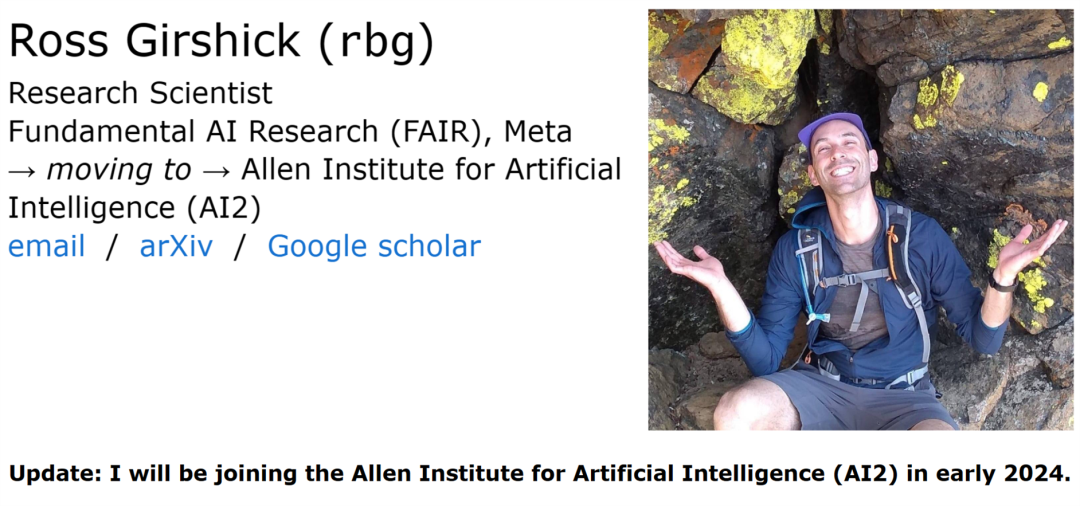
Ani Kembhavi, senior director of computer vision at AI2, said Ross Girshick will join the PRIOR team. PRIOR stands for Perceptual Reasoning and Interaction Research. It is the computer vision research team of AI2 and is committed to advancing computer vision research to create AI systems that can see, explore, learn and reason about the world
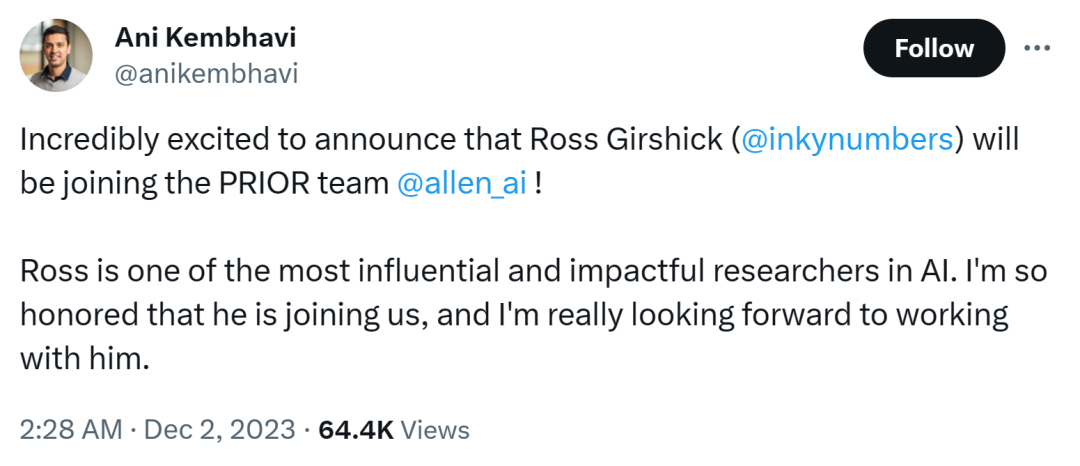
Source: https://twitter.com/anikembhavi/status/1730655170038821085
##Ross Girshick posted an article recalling his career at Meta, saying FAIR was and will remain an amazing place. But staying in one place for too long (8 years) may be a good reason to leave. Reinitialization and randomization are very important in a research career. In addition, he also stated that any talk about publishing indicators is pure nonsense.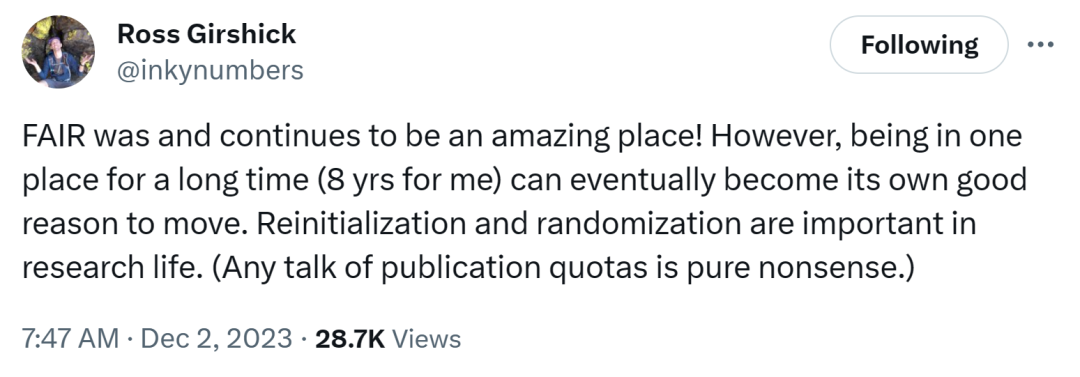
Please refer to the following link for image source: https://twitter.com/inkynumbers/status/1730735493711810639
In fact, in addition to the fact that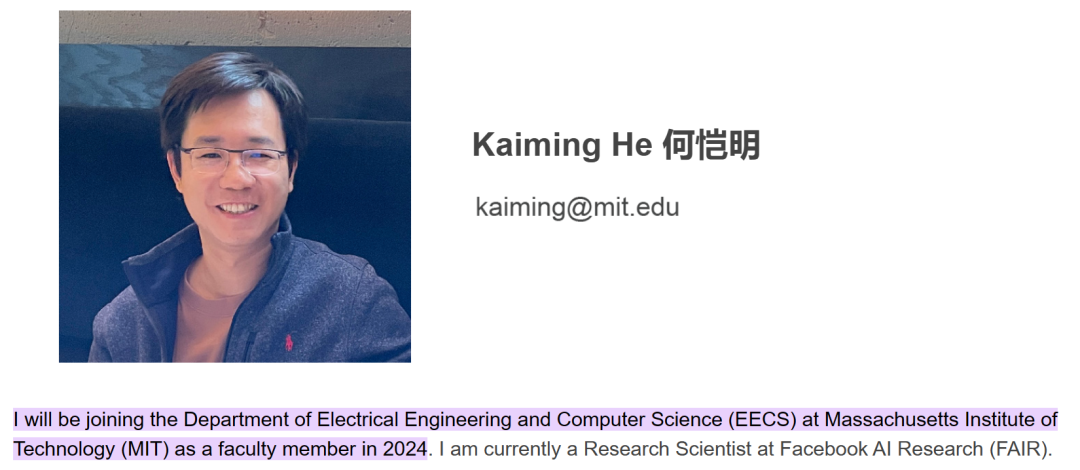

Rewritten content is as follows: Image source: https://twitter.com/LearnOpenCV/status/1730736970136158274
In the past year, Meta has successively open sourced large-scale models of the Llama and Llama 2 series, becoming an indispensable force in the open source community. However, Meta also faces many challenges in retaining artificial intelligence talents, and the loss of talent is inevitable. Scientists like Ross Girshick who have extensive experience in industry moving to universities or non-profit institutions will bring a unique perspective to academia and potentially produce more impactful research
RBG Master: Introduction to Ross Girshick
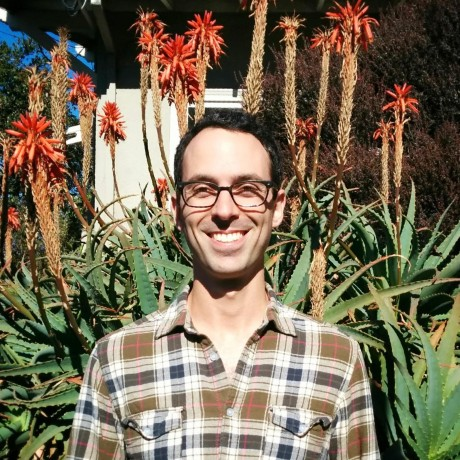
Personal homepage link: https://www.rossgirshick.info/
Previously, Ross Girshick was a research scientist at Meta FAIR, working on computer vision and machine learning from 2015 to 2023. He received his PhD in computer science from the University of Chicago in 2012.
Before joining FAIR, Ross served as a researcher at Microsoft Research and a postdoctoral fellow at the University of California, Berkeley. There, he studied under Professors Jitendra Malik and Trevor Darrell
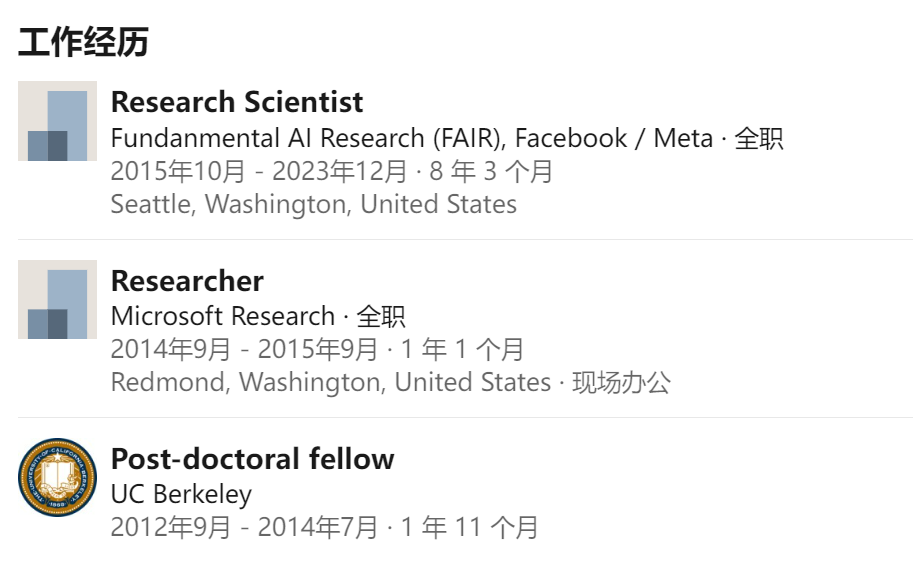
Ross’s research interests include visual perception algorithms (object recognition, localization, segmentation, pose estimation, etc.), representation learning (using pre-trained networks with strong supervision, weak supervision, or no supervision at all) and vision and language research.
For his contributions to open source software and datasets, Ross was awarded the 2017 PAMI Young Investigator Award, as well as the 2017, 2021, and 2023 PAMI Mark Everingham Awards
Ross Achieving many achievements in the field of artificial intelligence, he first became famous for developing the region-based convolutional neural network (R-CNN) object detection method. This research can be said to have completely changed the research direction in the field of target detection. Subsequent research such as Fast-RCNN and Faster-RCNN are all developed on the basis of R-CNN
His Google Scholar citation is currently Already more than 410,000 times
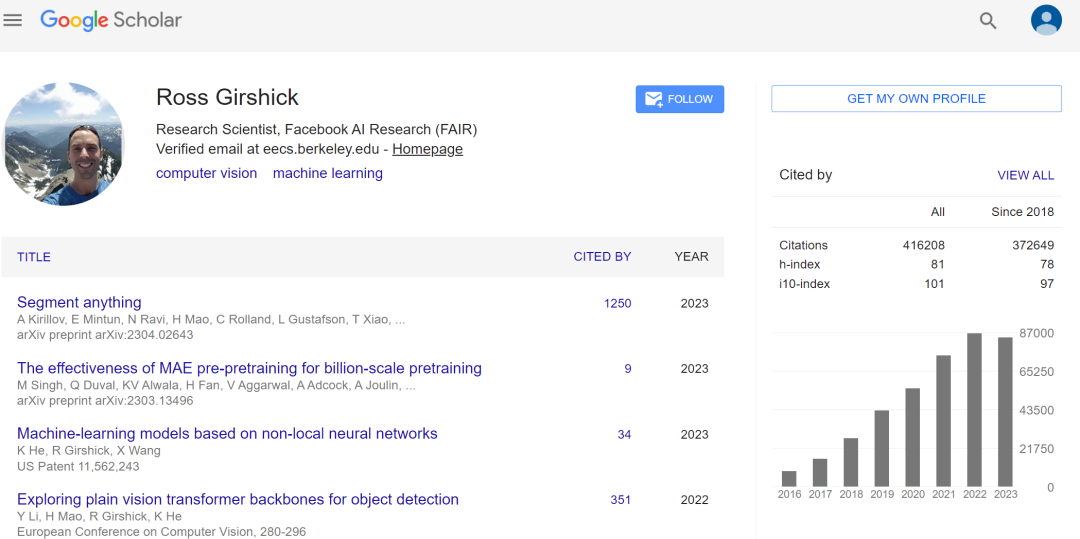
In the work Ross has participated in in the past, there are many popular research projects, such as Fast R-CNN, Mask R-CNN, YOLO, Faster R-CNN and SAM, etc.
In 2017, Mask R-CNN, which Ross participated in, won the ICCV Marr Award (Best Paper). This paper now has more than 30,000 citations; another paper "Focal Loss for Dense Object Detection" won the ICCV Best Student Paper that year.

In 2021, the paper "Masked Autoencoders Are Scalable Vision Learners" in which Girshick participated became a hot topic in the computer vision circle. This paper demonstrates a new method called masked autoencoders (MAE) that can be used as a scalable self-supervised learner for computer vision.
This year, Meta released the "Segment Anything" (Segment Anything) model (SAM), which has been hailed by many as a subversion of research in the traditional CV field. Ross is one of the authors of this paper. one.
Now I choose to go to AI2, and I look forward to more amazing works from Girshick.
The above is the detailed content of R-CNN author Ross Girshick resigned, He Kaiming and Xie Saining returned to academia, how many great minds have emerged from Meta CV. For more information, please follow other related articles on the PHP Chinese website!

Hot AI Tools

Undresser.AI Undress
AI-powered app for creating realistic nude photos

AI Clothes Remover
Online AI tool for removing clothes from photos.

Undress AI Tool
Undress images for free

Clothoff.io
AI clothes remover

AI Hentai Generator
Generate AI Hentai for free.

Hot Article

Hot Tools

Notepad++7.3.1
Easy-to-use and free code editor

SublimeText3 Chinese version
Chinese version, very easy to use

Zend Studio 13.0.1
Powerful PHP integrated development environment

Dreamweaver CS6
Visual web development tools

SublimeText3 Mac version
God-level code editing software (SublimeText3)

Hot Topics
 1375
1375
 52
52
 DeepMind robot plays table tennis, and its forehand and backhand slip into the air, completely defeating human beginners
Aug 09, 2024 pm 04:01 PM
DeepMind robot plays table tennis, and its forehand and backhand slip into the air, completely defeating human beginners
Aug 09, 2024 pm 04:01 PM
But maybe he can’t defeat the old man in the park? The Paris Olympic Games are in full swing, and table tennis has attracted much attention. At the same time, robots have also made new breakthroughs in playing table tennis. Just now, DeepMind proposed the first learning robot agent that can reach the level of human amateur players in competitive table tennis. Paper address: https://arxiv.org/pdf/2408.03906 How good is the DeepMind robot at playing table tennis? Probably on par with human amateur players: both forehand and backhand: the opponent uses a variety of playing styles, and the robot can also withstand: receiving serves with different spins: However, the intensity of the game does not seem to be as intense as the old man in the park. For robots, table tennis
 The first mechanical claw! Yuanluobao appeared at the 2024 World Robot Conference and released the first chess robot that can enter the home
Aug 21, 2024 pm 07:33 PM
The first mechanical claw! Yuanluobao appeared at the 2024 World Robot Conference and released the first chess robot that can enter the home
Aug 21, 2024 pm 07:33 PM
On August 21, the 2024 World Robot Conference was grandly held in Beijing. SenseTime's home robot brand "Yuanluobot SenseRobot" has unveiled its entire family of products, and recently released the Yuanluobot AI chess-playing robot - Chess Professional Edition (hereinafter referred to as "Yuanluobot SenseRobot"), becoming the world's first A chess robot for the home. As the third chess-playing robot product of Yuanluobo, the new Guoxiang robot has undergone a large number of special technical upgrades and innovations in AI and engineering machinery. For the first time, it has realized the ability to pick up three-dimensional chess pieces through mechanical claws on a home robot, and perform human-machine Functions such as chess playing, everyone playing chess, notation review, etc.
 Claude has become lazy too! Netizen: Learn to give yourself a holiday
Sep 02, 2024 pm 01:56 PM
Claude has become lazy too! Netizen: Learn to give yourself a holiday
Sep 02, 2024 pm 01:56 PM
The start of school is about to begin, and it’s not just the students who are about to start the new semester who should take care of themselves, but also the large AI models. Some time ago, Reddit was filled with netizens complaining that Claude was getting lazy. "Its level has dropped a lot, it often pauses, and even the output becomes very short. In the first week of release, it could translate a full 4-page document at once, but now it can't even output half a page!" https:// www.reddit.com/r/ClaudeAI/comments/1by8rw8/something_just_feels_wrong_with_claude_in_the/ in a post titled "Totally disappointed with Claude", full of
 At the World Robot Conference, this domestic robot carrying 'the hope of future elderly care' was surrounded
Aug 22, 2024 pm 10:35 PM
At the World Robot Conference, this domestic robot carrying 'the hope of future elderly care' was surrounded
Aug 22, 2024 pm 10:35 PM
At the World Robot Conference being held in Beijing, the display of humanoid robots has become the absolute focus of the scene. At the Stardust Intelligent booth, the AI robot assistant S1 performed three major performances of dulcimer, martial arts, and calligraphy in one exhibition area, capable of both literary and martial arts. , attracted a large number of professional audiences and media. The elegant playing on the elastic strings allows the S1 to demonstrate fine operation and absolute control with speed, strength and precision. CCTV News conducted a special report on the imitation learning and intelligent control behind "Calligraphy". Company founder Lai Jie explained that behind the silky movements, the hardware side pursues the best force control and the most human-like body indicators (speed, load) etc.), but on the AI side, the real movement data of people is collected, allowing the robot to become stronger when it encounters a strong situation and learn to evolve quickly. And agile
 ACL 2024 Awards Announced: One of the Best Papers on Oracle Deciphering by HuaTech, GloVe Time Test Award
Aug 15, 2024 pm 04:37 PM
ACL 2024 Awards Announced: One of the Best Papers on Oracle Deciphering by HuaTech, GloVe Time Test Award
Aug 15, 2024 pm 04:37 PM
At this ACL conference, contributors have gained a lot. The six-day ACL2024 is being held in Bangkok, Thailand. ACL is the top international conference in the field of computational linguistics and natural language processing. It is organized by the International Association for Computational Linguistics and is held annually. ACL has always ranked first in academic influence in the field of NLP, and it is also a CCF-A recommended conference. This year's ACL conference is the 62nd and has received more than 400 cutting-edge works in the field of NLP. Yesterday afternoon, the conference announced the best paper and other awards. This time, there are 7 Best Paper Awards (two unpublished), 1 Best Theme Paper Award, and 35 Outstanding Paper Awards. The conference also awarded 3 Resource Paper Awards (ResourceAward) and Social Impact Award (
 Li Feifei's team proposed ReKep to give robots spatial intelligence and integrate GPT-4o
Sep 03, 2024 pm 05:18 PM
Li Feifei's team proposed ReKep to give robots spatial intelligence and integrate GPT-4o
Sep 03, 2024 pm 05:18 PM
Deep integration of vision and robot learning. When two robot hands work together smoothly to fold clothes, pour tea, and pack shoes, coupled with the 1X humanoid robot NEO that has been making headlines recently, you may have a feeling: we seem to be entering the age of robots. In fact, these silky movements are the product of advanced robotic technology + exquisite frame design + multi-modal large models. We know that useful robots often require complex and exquisite interactions with the environment, and the environment can be represented as constraints in the spatial and temporal domains. For example, if you want a robot to pour tea, the robot first needs to grasp the handle of the teapot and keep it upright without spilling the tea, then move it smoothly until the mouth of the pot is aligned with the mouth of the cup, and then tilt the teapot at a certain angle. . this
 Hongmeng Smart Travel S9 and full-scenario new product launch conference, a number of blockbuster new products were released together
Aug 08, 2024 am 07:02 AM
Hongmeng Smart Travel S9 and full-scenario new product launch conference, a number of blockbuster new products were released together
Aug 08, 2024 am 07:02 AM
This afternoon, Hongmeng Zhixing officially welcomed new brands and new cars. On August 6, Huawei held the Hongmeng Smart Xingxing S9 and Huawei full-scenario new product launch conference, bringing the panoramic smart flagship sedan Xiangjie S9, the new M7Pro and Huawei novaFlip, MatePad Pro 12.2 inches, the new MatePad Air, Huawei Bisheng With many new all-scenario smart products including the laser printer X1 series, FreeBuds6i, WATCHFIT3 and smart screen S5Pro, from smart travel, smart office to smart wear, Huawei continues to build a full-scenario smart ecosystem to bring consumers a smart experience of the Internet of Everything. Hongmeng Zhixing: In-depth empowerment to promote the upgrading of the smart car industry Huawei joins hands with Chinese automotive industry partners to provide
 Tested 7 'Sora-level' video generation artifacts. Who has the ability to ascend to the 'Iron Throne'?
Aug 05, 2024 pm 07:19 PM
Tested 7 'Sora-level' video generation artifacts. Who has the ability to ascend to the 'Iron Throne'?
Aug 05, 2024 pm 07:19 PM
Editor of Machine Power Report: Yang Wen Who can become the King of AI video circle? In the American TV series "Game of Thrones", there is an "Iron Throne". Legend has it that it was made by the giant dragon "Black Death" who melted thousands of swords discarded by enemies, symbolizing supreme authority. In order to sit on this iron chair, the major families started fighting and fighting. Since the emergence of Sora, a vigorous "Game of Thrones" has been launched in the AI video circle. The main players in this game include RunwayGen-3 and Luma from across the ocean, as well as domestic Kuaishou Keling, ByteDream, and Zhimo. Spectrum Qingying, Vidu, PixVerseV2, etc. Today we are going to evaluate and see who is qualified to sit on the "Iron Throne" of the AI video circle. -1- Vincent Video



